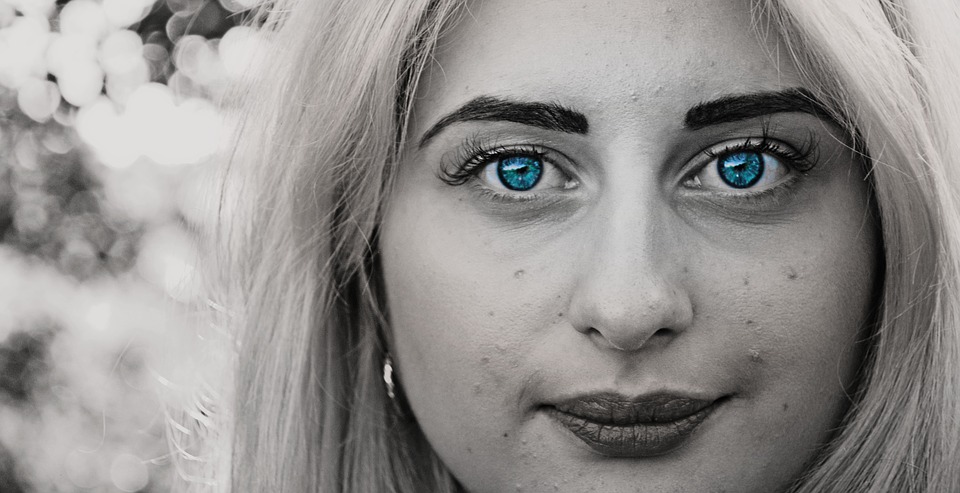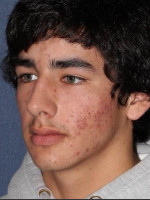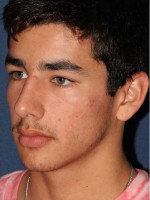What's The Deal With Adult Acne?

By Chelsea Campbell
Acne has traditionally been associated with those awkward teenage years, along with braces and bad hairstyles. But while we may have outgrown the orthodontia and learned our way around a flat iron, acne may still be a lingering trouble that just won't leave itself in the past. In fact, according to a 2018 study in the Clinical, Cosmetic and Investigational Dermatology journal, adult acne is actually experiencing a considerable surge, particularly among women, whereby 50 percent will experience some kind of acne during their adult years. So what gives? Why are we still battling breakouts, and what can we do to get rid of those pesky pimples?
Hormones
Although experts cannot yet pinpoint why adult acne is on the rise, many believe that a combination of stress, hormones, and external factors that clog pores are the culprit. It is probably obvious that hormones play a major role in the development of acne as, most people experience acne's onslaught during their teenage years, when hormones (specifically testosterone) are in flux, and many women get breakouts in the days leading up to their periods. Birth control has also been considered as a possible factor, as more females begin the pill at a younger age and skin does not naturally experience fluctuations in oil production until discontinuation in adulthood. Once you stop taking the pill, your body has to adjust to normal hormone productions and this can lead to increased oiliness and breakouts.
Clogged Pores
Many hair and skin products contain substances that congest pores and irritate skin and consequently, cause flare-ups. You should take care to only use oil-free, non-comedogenic (non-clogging) products on areas prone to acne to minimize irritation. Some common ingredients to avoid are coconut oil, SD and denatured alcohol, and emollients (look for names ending in "-ate"), which are heavy and can clog pores. On that note, go easy on the products in general.
Dermatologists say that sometimes women load on so many products (hey, we're also trying to curb signs of aging here!) that their heavy routines can cause breakouts. And before you decide to go full force with anti-acne products, keep in mind that the skin of adults is not quite as oily and hardy as a teenager's, so harsh, drying acne medication or cleansers often have the opposite of the intended effect on adult acne - our more sensitive skin reacts poorly to such strong products and it actually can lead to more flare-ups.
Cleanse Correctly
Sweating often and not washing the skin afterward can cause breakouts, but conversely, washing your face too often or too hard can be counterintuitive as it causes skin to become dry and irritated, signaling your body to produce more sebum to counteract the dryness and restore pH balance. Washing your face after exercising or sweating excessively is a wise idea, but otherwise a gentle, thorough cleansing in the evening before bed and once in the morning is sufficient. Adult acne often differs from the teen variety in its location, occurring more often on the lower face and jaw area rather than on forehead and cheeks. Aim to avoid touching your face as well so that dirt, oil, and bacteria from your hands are not transmitted to the pores on your face.
Although stress does not specifically cause acne, it can cause flare-ups when stress disrupts the body's hormonal balance. Lisa A. Garner, MD, FAAD, clinical professor of dermatology at the University of Texas Southwestern Medical Center agrees, "When you already have acne and you get into a stressful situation, that seems to be when your acne really flares up. And even if scientists still aren't exactly sure what the correlation between stress and acne is, a 2003 Stanford University study showed that acne severity correlated highly with increasing stress. So the next time you seem to be suddenly breaking out, try to pinpoint what could be frazzling you so that you can find time to de-stress.
Consistency is Key
If you are trying out a new acne product, consistency is key. Acne is on an 8 week cycle, so it may take up to 2 months before you notice visible results. Retinoids are particularly good for treating both acne and being a powerful anti-aging ingredient. If you feel that your acne is very severe, painful, or detrimental to your self-esteem, see a dermatologist who can advise you with options for medication. And remember: if you do suffer from adult acne, you're in good company. Take the time to treat your skin well and know that even if breakouts still plague you, you've come a long way since that freshman yearbook photo!


